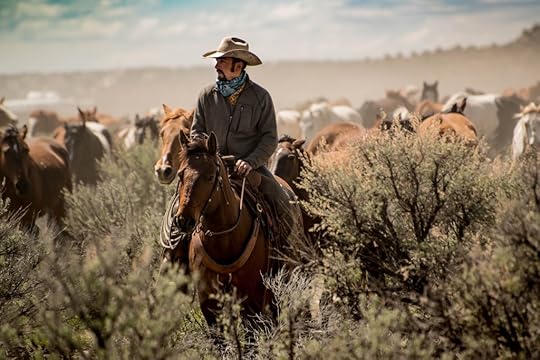A random encounter with a grumpy cowboy

On the second day of our Colorado vacation, I met a grumpy cowboy.
As we came down the road from Cottonwood Pass, between Buena Vista and the Taylor Reservoir, my wife suggested that we take the back way, turning north and looping around past Spring Creek — the first place we camped in Colorado some 30 years ago.
Soon after the paved road turned to dirt, traffic was stopped by a small cattle drive. The herd was being driven by one cowboy and one cowgirl on horseback, another man in an all-terrain vehicle, and two cow dogs. We watched them work. The dogs, in particular, were incredible. As soon as they spotted a straggler, they would spring into action, nipping at the heels of the wayward cows and bringing them back to the group.
Because of the hills on one side of the road and a creek on the other, the cowhands had to drive the herd up the road, toward the waiting traffic. As they moved forward, the cars behind them, where we were, began inching up. At one point, the camper in front us pulled forward, basically splitting the herd. Suddenly, we found ourselves with cows on both sides of us, and the dogs and cowhands frantically trying to collect the stragglers amid the cars.
I could hear the lead cowboy cussing as he road toward us. It was a warm sunny day, and his felt hat was soaked through with sweat.
Unsure what to do, I started to inch forward, thinking it would allow them better access to the separated cows. Then, one of the dogs ran close to our Jeep, and I stopped. The cowboy turned toward me. I nodded.
He wasn’t pleased. He pointed at me and said, “That dog is worth more than your life.”
I told him I was watching the dog. After all, that’s why I stopped. It wasn’t a situation that lent itself to a lot of explanation, but I felt bad to be adding to his obvious frustration.
I had to think that if they had more help, they might have been able to manage the traffic as well as the cows, or at least communicated with the motorists. But, of course, the economics of ranching don’t allow for an abundance of labor. Ranches, like many other businesses, are shorthanded these days, and the day rates they pay cowhands has been declining for decades.
I could sympathize with the difficulty of moving cattle down a public road in an area that attracts tourists, including dirt bikes and loud off-road vehicles that can spook the cows. But mostly, I found myself replaying the scene from The Big Empty in which Blaine Witherspoon gets too close to Trace Malloy’s cutting horse. Witherspoon is imagining himself adjusting to his new surrounding, resting his foot on the corral fence. Just as he begins to feel confident, Malloy’s voice cut into his thoughts.
“Son, you’re in about the worst place you could possibly be.”
When the cows were finally clear of the road, I drove on, feeling rather Witherspoon-ish for a few miles. But something else bothered me. Writing a book means making thousands of little decisions, and often, you find yourself surprised at something you overlooked. Now, as we wound along the dirt mountain road, I thought: I should have given Malloy a dog.



